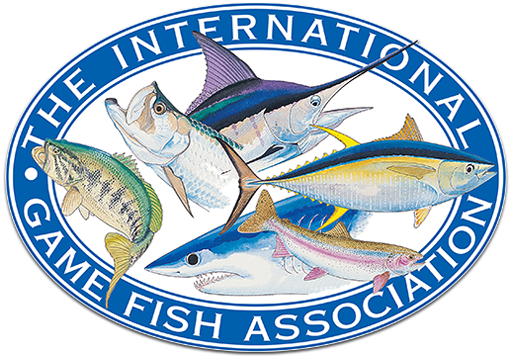2025 IGFA Fishing Hall of Fame Induction Ceremony Highlights
Presented by

The 25th Annual IGFA Fishing Hall of Fame was nothing short of unforgettable. Hosted at the breathtaking Johnny Morris' Wonders of Wildlife National Museum and Aquarium, the event honored a remarkable 2025 class now counted among angling’s finest. These inductees join 151 legendary anglers, scientists, conservationists, writers, and fishing industry leaders whose contributions to sport fishing are preserved and celebrated in the IGFA Fishing Hall of Fame. If you missed the celebration, you can watch the full ceremony recording below.
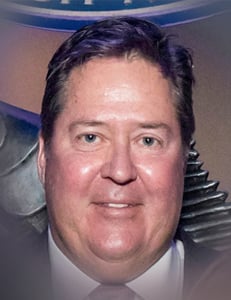
"For me, to be recognized years ago by this esteemed body is something that runs deep in my soul and is an incredibly overwhelming honor, " said IGFA Trustee John Barrett, the night's emcee.
"Their (the honorees) stories will remind us that we cherish this sport, why we fight to protect it, and why the simple act of fishing holds such power in all of our lives."
The 26th Annual Induction Ceremony was held Saturday, September 6, 2025, in Springfield, Missouri. The event, presented by IGFA Corporate Partner Bass Pro Shops - Cabela's, drew attendees from across the globe.
"As we honor these exceptional individuals in the IGFA Fishing Hall of Fame, we celebrate not just their extraordinary achievements, but their lasting impact on the future of sportfishing," said IGFA President Jason Schratwieser. "Their unwavering commitment to innovation, conservation, and mentorship has shaped the sport in profound ways, inspiring generations to come."
The IGFA would like to sincerely thank all of the sponsors who helped make the IGFA Fishing Hall of Fame evening possible: Bass Pro Shops and IGFA Trustee Emeritus Johnny Morris, Bonefish & Tarpon Trust, Dreamcatcher Foundation and IGFA Trustee Emeritus Bob Rich, Bud N’ Mary’s Marina and Captain Richard Stanczyk, IGFA Chairman Roy Cronacher, IGFA Trustee Andy Mill, Wild Oceans and IGFA Trustee Emeritus Tim Choate, IGFA Trustee Gary Carter and Sherrell Carter, and Captain Skip Smith.
To learn more about the inductees, please watch the videos below that IGFA created for these luminaries of our sport.
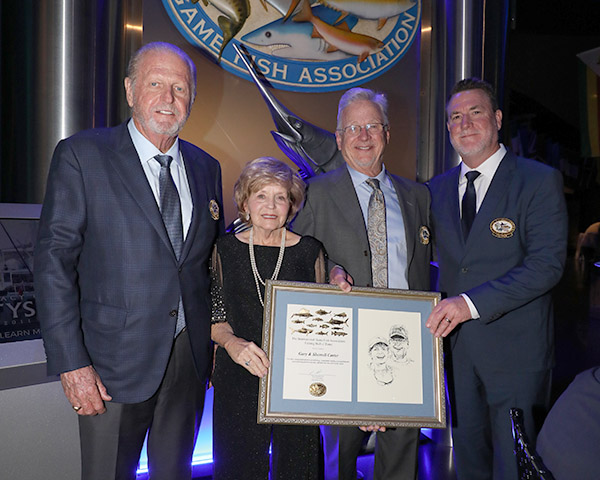
Few husband-and-wife duos have left such a lasting mark on the world of light tackle and big game angling as Gary and Sherrell Carter. Gary and Sherrell were both born in Atlanta, Georgia, just months apart—Gary on December 1, 1948, and Sherrell on February 7, 1949. As a child, Gary periodically fished on his family’s farm pond catching bass with a cane pole. Sherrell had a similar upbringing, being introduced to fishing on family trips to the mountains. In 1958, Gary and his family drove from Atlanta, Georgia, to Acapulco, Mexico, where he watched his father catch a 129-pound sailfish. This was his first exposure to offshore fishing.
Gary & Sherrell married at age 19 and while fishing remained a part of their life it certainly was not a prevalent passion in the early days. Through his college years Gary would trout fish nearly every weekend in the mountains of North Georgia, Sherrell jokingly would say this was his excuse to “get away from the wife.”
In 1973, during a work trip to California, Gary and Sherrell extended their travels with a return to Acapulco, where Gary had first experienced offshore fishing 15 years earlier. While there, they chartered a local boat under a simple deal: $100 for a guaranteed catch, with the trip ending as soon as the fish was landed. Gary landed a 132-pound sailfish, beating his father’s fish by three pounds, to this day it’s the largest sailfish he has ever caught. It wasn’t until a few decades later that the couple began to focus on offshore fishing and truly developed their passion. They began fishing offshore in Stuart, Florida, catching sailfish and then eventually would make their way to the Bahamas where they caught their first blue marlin as a couple. As often is the case with passionate billfish anglers, this first encounter would end up being an expensive one as it sparked a lifelong passion for billfishing.
The couple spent several years fishing throughout the Bahamas and the Caribbean, culminating in a milestone trip to San Salvador on January 10, 1998. There, Gary landed a 207-pound, 8-ounce oceanic whitetip shark, his first IGFA All-Tackle World Record and his introduction to the International Game Fish Association (IGFA). Their next exposure to the IGFA was in the pursuit of an IGFA Billfish Royal Slam sparked by several surprise spearfish releases on a trip to Venezuela. They set out with a goal of completing the IGFA Billfish Royal Slam on their own boat, traveling to Cocos Island, Costa Rica, to catch the remaining species in the Pacific and were able to accomplish their goal in May of 1999. During this time, Gary and Sherrell developed a passion for light tackle angling, an interest that would shape the next two decades of their fishing adventures. In the words of Sherrell, “the Carter family likes a challenge.”
Gary and Sherrell Carter are two of the most accomplished light tackle anglers in IGFA history, with a combined 45 IGFA World Records, 39 of which still stand today. Gary has held 23 IGFA World Records, including 10 billfish records, two of which were caught on fly. All his 23 records were caught on 20-pound line class or less. Beyond his record catches, Gary has earned numerous IGFA Slam and Trophy Club honors, including 10 IGFA Billfish Royal Slams, six IGFA Billfish Grand Slams, and the rare distinction of being one of only two individuals to achieve both an IGFA Billfish and Tuna Royal Slam. Not to be outdone, Sherrell has held 22 IGFA World Records, 18 of which still stand today. Her impressive record resume includes six billfish records, and like her husband all 22 of her records were caught on 20-pound line class or less. Both Gary and Sherrell have been honored with the prestigious IGFA Bob Herder Light Tackle Award for outstanding achievements in the field of light tackle angling.
Gary has always believed in giving back to the sport that has given so much to him and Sherrell. His dedication to the IGFA spans more than two decades, beginning in 2001 as an International Representative. In 2012, he joined the IGFA Board of Trustees, where he continues to serve and actively champion the organization’s mission.
To this day, both Gary and Sherrell continue to pursue IGFA world records and the challenge of light tackle angling. Sherrell’s most recent records came in June of 2024 while chasing walleye and muskellunge in Minnesota. Gary’s most recent record came in 2023 when he set the IGFA Men’s 20-lb Tippet Class World Record for Atlantic blue marlin. With their home base currently in Costa Rica, the couple often travel to marlin hotbeds, like Madeira and Portugal, in pursuit of big blue marlin on light line.
In recognition of their shared dedication to sportfishing, remarkable angling accomplishments, and a lifelong partnership that embodies the true spirit of the sport, the IGFA is honored to induct Gary and Sherrell Carter into the IGFA Fishing Hall of Fame.
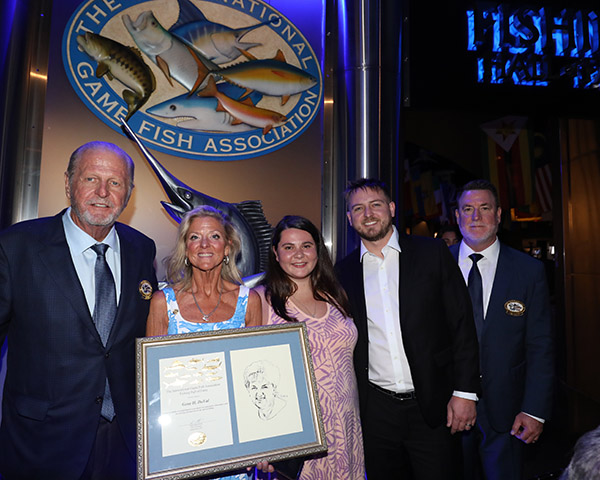
A skilled angler, dedicated conservationist, and tireless advocate for women in sportfishing, Gene DuVal made a lasting impact on the world of fishing. Born on June 7, 1943, in Lexington, North Carolina, Gene was first introduced to the sport by her father on local ponds. Though fishing wasn’t a major part of her early life, that changed after a blind date in Virginia Beach, Virginia, with William DuVal, her future husband. During one of their first conversations, William asked, 'Do you like to fish?' Two weeks later, the couple were in Bermuda competing in the Bermuda International Light Tackle Tournament, where Gene landed her first tuna, a species that would become her favorite to pursue. As their love for each other deepened, so did their shared passion for fishing.
Over the years, the couple traveled frequently between Virginia, Nags Head, North Carolina, and Key West, Florida, fishing whenever they could. Remarkably, they managed to do this while still running a successful business, having important messages faxed to their house in Key West so they could respond as soon as they got off the water, creating the impression that they were still working from their office in Virginia.
As Gene’s fishing talents grew, she began using light tackle more frequently and gained valuable insights from seasoned captains and anglers, including Tommy Gifford Award recipient Captain Robert “RT” Trosset and IGFA Fishing Hall of Fame Inductee Stewart Campbell. With their guidance, Gene began to set IGFA Line and Tippett Class World Records throughout her travels.
Few anglers can match the impressive IGFA World Record resume of Gene DuVal. Over her lifetime, Gene set 135 IGFA World Records, 80 in the Line Class category and 55 in the Tippet Class. Remarkably, 34 of her records still stand today. Her devotion to light tackle angling is evident: 133 of her records were achieved on 20-pound test or lighter, including a 35-pound blackfin tuna on 8-pound test, a 54-pound, 8-ounce king mackerel on 12-pound test, and a 56-pound lingcod on 12-pound test. Over four decades of record chasing, Gene set marks for 30 different species while traveling between Key West, North Carolina, Bermuda, and Alaska. She often brought her family along on these adventures, sharing her passion for fishing with her grandchildren whenever possible.
While her passion for fishing was prevalent on the water, it was present on land as well. In the early 1970s Gene and her husband helped found and fund the Conservation Council of Angling Clubs of Virginia. Equal to her passion for fisheries conservation was her passion for inclusion in the sport. Gene was an advocate for female anglers and would go on to become an integral part of the International Women’s Fishing Association, the IWFA, serving on the board of directors as trophy chairman, rules chairman, tournament chairman and district representative chairman. She worked closely with influential women in the sport such as Lisa Booth and IGFA Fishing Hall of Fame Inductee Joan Vernon. She was inducted into the IWFA Hall of Fame in 2005. During her fishing trips, Gene often took the time to share her knowledge and skills with other female anglers, teaching techniques like knot tying with patience and care to ensure her lessons made a lasting impact. While living in North Carolina, she helped establish a children’s tournament alongside the renowned Alice Kelly Ladies Billfish Tournament, encouraging women to bring their kids and pass on a shared passion for fishing.
Above all else, it was clear that what Gene cherished most was sharing her love of fishing with those around her. Her goal was never to break records, though she set many, but to create lasting memories on the water with the people she loved. When recounting Gene’s illustrious career as an angler, conservationist, educator and mentor for female anglers, there is one overarching theme that reigns true. Those who had the opportunity to fish with Gene DuVal were truly blessed.
For her incredible accomplishments as an angler, her passion for conservation, and her advocacy for inclusion in the sport of fishing, the IGFA is proud to induct Gene DuVal into the IGFA Fishing Hall of Fame.
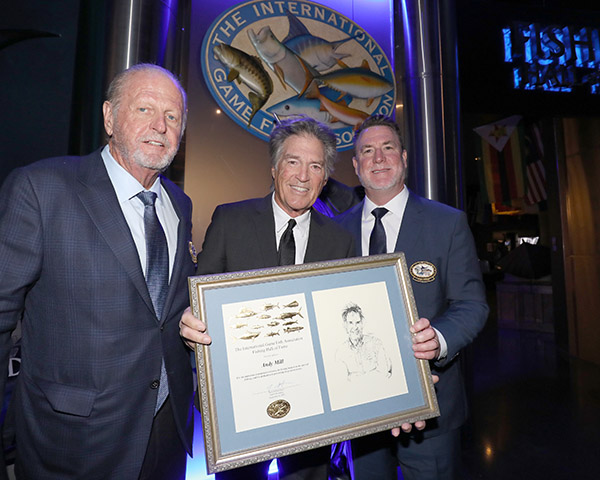
Andy Mill’s remarkable journey from Olympic skier to elite fly fisherman is a testament to a competitive spirit that knows no bounds. Born on February 11, 1953, in Fort Collins, Colorado, Andy spent his early years skiing in the winter and fishing in the summer. Andy was first introduced to fly fishing by his childhood friends. He then learned how to tie flies at the age of 12 with the help of Chuck Fothergill, his first fly being a “renegade.” He found immediate success with this fly while fishing the Roaring Fork River, having a trout rise and take the fly in front of him. This experience shaped Andy’s passion for the beauty and nuances of fly fishing.
Along with his passion for fishing, Andy developed a love of skiing at a young age. Growing up in Aspen, Andy would wait with anticipation for the first snowflake of fall to make his way to the slopes. As his skillset developed, he joined the Aspen Ski Club and began to compete in downhill skiing events. He would compete in races around Aspen and Vail before expanding to events throughout Colorado, and then at 12 years old he competed in the JC Junior Nationals, an event that showcased the top skiers in the country. Andy would go on to win that event and would ultimately be named to the U.S. Ski Team at age 16. He would then travel to Europe and compete internationally, cementing himself as an elite alpine downhill racer, and the best American skier in that event from 1974-1981. Over the course of his career, he skied in two Olympics and four World Championships. For his 1976 Olympic heroics in Innsbruck, Austria, where Andy placed 6th while skiing on a severely injured leg, he was awarded the “Olympic Spirit Award.”
Following his skiing career, Andy ventured into the world of broadcasting, spending 20 years covering the Olympic Games, world championships, and network specials. Throughout this time Andy hosted and produced the “Sportsman’s Journal with Andy Mill,” showcasing some of the world’s premier fishing destinations and bringing the thrill of fishing into living rooms across the country.
Andy sustained his drive to compete well after his skiing career. He was able to translate that drive into tournament fishing, which gave him the opportunity to compete at a high level once again. With laser focus, Andy put together a career of tournament success that is profound, winning more invitational tarpon fly events than anyone in history. His impressive tournament resume includes five Gold Cup Tarpon Tournaments, viewed as the most prestigious tarpon tournament in saltwater fly fishing, six Golden Fly Tarpon Tournaments and a Don Hawley Tarpon Tournament victory. Andy also won the Fall Fly Invitational Bonefish Tournament, the Del Brown Permit Tournament, and was the first of only three anglers ever to win a bonefish, tarpon and permit tournament on fly. He took immense pride in his preparation and attention to detail and would approach each event with the confidence that he would leave victorious.
Andy is also a celebrated author, having penned what many consider the definitive guide to catching tarpon on the fly, A Passion for Tarpon. In the foreword, former United States President George H.W. Bush wrote, “Andy Mill knows tarpon as well as anyone alive. Many experienced guides in the Florida Keys say he’s the best they have ever fished with—maybe the best who has ever fished tarpon with a fly.” High praise from a fellow angler and a testament to Andy’s unmatched expertise and enduring influence in the world of fly fishing.
In 2020, Andy and his son Nicky launched the Mill House Podcast, a show dedicated to preserving the stories and legacy of the outdoors through in-depth conversations with the innovators, legends, and pioneers of the fishing and outdoor world. More than just a fishing podcast, Mill House has become a trusted source for educational content and compelling, untold stories from some of the most influential figures in the industry. With over 143 interviews to date, the podcast has established Andy as one of the leading voices in sport fishing and outdoor storytelling.
Andy’s dedication to conservation and sport has earned him a place among some of the most respected institutions in the angling and outdoor world. He currently serves on the International Game Fish Association Board of Trustees, is a founding and emeritus board member of Bonefish & Tarpon Trust and sits on the Honorary Advisory Board of the American Museum of Fly Fishing. His contributions have not gone unnoticed, and he is no stranger to halls of fame, having been inducted into both the Aspen Hall of Fame and the Colorado Snowsports Hall of Fame. In 2022, his impact in media and conservation was further recognized with the Bonefish & Tarpon Trust’s Curt Gowdy Memorial Media Award, honoring individuals who advance saltwater conservation through writing, entertainment, and media outreach.
In recognition of his numerous tournament victories, his lasting impact on the sport of fishing, and his dedication to preserving its greatest stories, the IGFA is proud to welcome Andy Mill into the IGFA Fishing Hall of Fame.
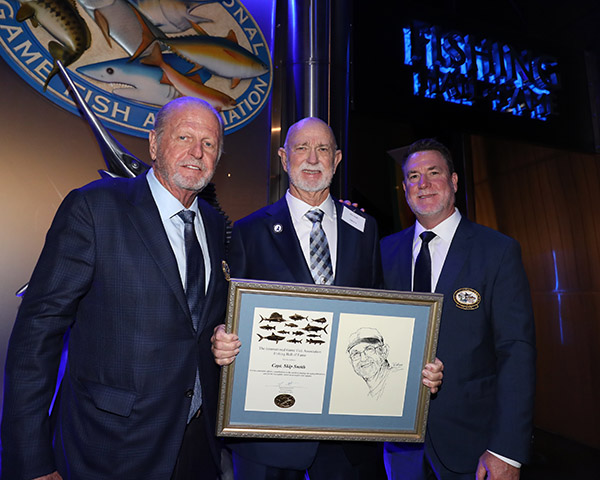
Skip Smith is widely regarded as one of the greatest captains in sportfishing history. Born in Denver, Colorado, on July 14th, 1955, Skip was raised in Fort Lauderdale, Florida, where his family owned the Captain Bill drift boat out of Bahia Mar Marina. Skip began fishing on the boats at just five years old, starting out by baiting hooks and eventually collecting money from the guests. Throughout his childhood, he spent summers and weekends working aboard the family boats. As his passion for offshore fishing grew, Skip set his sights on working aboard local charter boats—despite his father's advice to stick with the drift boats. At 18, he got his chance to mate on a charter, and one memorable day, the boat landed a white marlin. From that moment on, he was hooked.
Skip eventually transitioned to working on longline swordfishing boats, where he found great success during his first few seasons. But in 1979, a serious injury to his arm and hand forced him to take an extended break from the water. While recovering, he took a mating job on a boat in Texas, where he crossed paths with IGFA Fishing Hall of Fame inductee Jerry Dunaway. Jerry offered Skip a position aboard his boat, Hooker. Although Skip had planned to return to longlining, drawn by the strong earnings, Jerry’s persistence convinced him to take the opportunity that would ultimately define his career. In the early years aboard Hooker, Skip fished across the Caribbean, from Belize to the Bahamas, and competed in prestigious tournaments like Poco Bueno in Texas, where the team aboard the Hooker claimed victory in 1981 with a 420-pound blue marlin.
Intrigued by what he had read about Panama’s exceptional fishery, Skip persuaded Jerry in 1983 to move their operation to the Pacific. As their skillset grew, they began fishing light tackle with the ultimate goal of setting IGFA Line Class World Records. They encountered some difficulties during the first few years, from the line over-testing, to someone else submitting a larger fish before they could. Throughout their attempts, both captain and crew became more comfortable with the process and eventually, in 1986, they set the first of several IGFA World Records aboard the Hooker. Skip would go on to guide anglers to 49 IGFA World Records, with the majority set for billfish on light tackle. Some notable records include Jerry Dunaway’s 109-pound swordfish, which set the IGFA Men’s 8-lb Line Class Record in 1986, Deborah Dunaway’s 109-pound 12-ounce, Pacific sailfish, which set the IGFA Women’s 4-lb Line Class Record in 1989, and Michele Craig’s 128-pound, 9-ounce swordfish, which set the IGFA Women’s 8-lb Line Class Record in 2004. All three of these IGFA World Records still stand to this day.
In 1987, Jerry purchased the Madam, a 110-foot oil supply boat which, after a major refit, served as the home for the Hooker. The Madam and the Hooker became one of the world’s first global mothership sportfishing operations. For the next four years, Skip served as the captain of both vessels as they traveled and fished the world’s top destinations.
In addition to his accomplishments on the water, Skip has built an impressive career off the water as well. He has contributed to Marlin magazine and numerous other publications, sharing his expertise and stories from a lifetime in sportfishing. He also authored and published his own book, Tales of a Hooker and Her Madam, which chronicles his global adventures.
As president of Smith-Merritt Insurance, Skip draws on decades of on-the-water experience to provide specialized insurance solutions tailored to the unique needs of the sportfishing community. In 2002, Skip utilized his connection with the sportfishing industry to create the Custom Shootout, a tournament in the Bahamas with a focus on benefiting multiple charitable organizations. In 2015, he expanded “Skip’s Tournaments” to include, The Shootout. Both tournaments have become increasingly popular and attract top sportfishing teams from around the globe each year.
Throughout his career, Skip has served as a mentor to countless mates and aspiring captains, generously sharing his knowledge and passion for the sport. His travels introduced him to many of the industry’s top captains and crews, forging friendships that would last a lifetime. Inspired by the legacy of these remarkable individuals and his deep appreciation for the sport, Skip founded the IGFA Tommy Gifford Award, an honor that recognizes legendary captains and crew who have earned the respect of their peers through meaningful contributions to recreational angling. Since the award’s inception in 2011, Skip has chaired the IGFA’s Legendary Captain and Crew Committee, guiding the selection of each year’s honorees with the same dedication he’s shown throughout his life on the water.
For his charitable efforts, contributions to the world of angling through publications, and for his incredible career as an angler and captain, the IGFA is proud to induct Captain Skip Smith into the IGFA Fishing Hall of Fame.
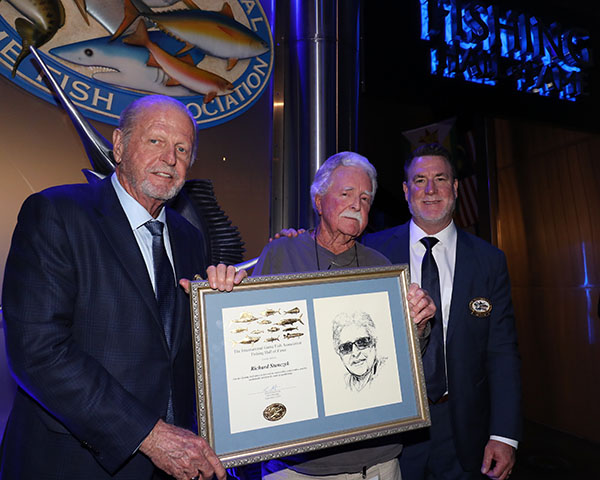
Captain Richard Stanczyk’s journey into sport fishing began with a cane pole in St. Louis, Missouri, and evolved into a legacy that transformed offshore fishing and introduced thousands to a way of life on the water. He often credits his grandfather, who first walked him around a small lake to show off his bluegill catch, for planting the seed. That bond, that moment, became the anchor for a life defined by passion, mentorship, and unwavering dedication to sport fishing and the ocean.
Though Richard would go on to earn an accounting degree from the University of Miami, he quickly realized that fluorescent lights and ledgers could never replace the pull of a fish or the salt in the air. He gave the office life a try, working long hours in a small room with bars on the window, running audits and adding machines. But it felt like a prison. The breaking point came when he picked up the phone, called his mother, and said, “I can’t do this anymore.” Against the advice of many, including his tearful mother, he walked away from the profession his grandfather had helped him achieve, chasing instead a dream most would consider uncertain.
That decision led to years of bold ventures, including time running a bar and restaurant in Miami, Florida, investing in oil fields in Kentucky, and even living in Alaska. But fishing was always at the center. By the time he was 15, he had run a boat to Bimini on his own. At 19, he caught his first blue marlin in the deep waters off the Bahamas, with only a compass, a homemade rig, and no GPS or radio. He slept beside that fish in his boat, terrified that he might lose it if the boat sank overnight. That marlin, caught with raw determination, now lives in memory and photographs, a symbol of the start of a storied career.
Richard’s early days were defined by curiosity and humility. He learned from the greats—legends like Captain Jimmy Albright, who, while intimidating, taught him the discipline and ethics of sportfishing. He fished alongside icons like Captains Harold Adler and Vic Gaspeny, sharing friendships that would span decades and reshape the culture of saltwater angling in the Florida Keys.
One of Richard’s contributions to the sport was his role in pioneering daytime swordfishing. While many credit him with its invention, he humbly clarifies: “We didn’t discover it, we innovated it.” What began in Venezuela, he and his team adapted for the much more challenging waters off Islamorada. After years of trial, error, and obsession, the breakthrough came: daytime swordfish could be caught consistently. In one two-day span, Richard and his team released 11 broadbills.
This innovation would eventually go public in a cover story for Sport Fishing magazine— “Swordfish Shocker” but not before Richard, his son Nick, brother Scott, and Vic had proven it was more than a fluke. Swordfish became accessible to a new generation, and the Keys would never be the same.
But perhaps Richard’s greatest contribution to sportfishing is not a record, a rig, or a magazine cover. It’s Bud N’ Mary’s Marina.
Originally a customer there in the 1970s, Richard fell in love with the place long before he ever imagined owning it. The opportunity came unexpectedly. After a failed deal by another buyer, Richard took a leap of faith and purchased the marina, at great personal risk, with no business partner and no guarantee of success. What he created was a haven where captains could build their livelihoods, where kids could grow into guides, and where fishing remained accessible, authentic, and deeply rooted in tradition.
Over nearly five decades, Bud N’ Mary’s has become a cornerstone of the Keys’ sportfishing identity. Richard fondly calls it "B&M University" a place where young anglers, dockhands, and mates learn more than fishing; they learn integrity, humility, and resilience. Richard has always said, “I can teach someone how to fish, but I can’t teach them character.” It’s that belief that shaped a culture. Richard raised his sons, Nick and Rick, on those same docks. He never forced them into fishing; they chose it. Both became exceptional anglers and professionals in their own right, bringing new energy and vision to the family legacy.
Through it all, Richard has remained grounded in his original purpose: to preserve the experience of fishing. Yes, the fisheries have changed, the technology is different, and the challenges ahead are real—habitat loss, overfishing, climate impacts. But Richard believes in the power of mentorship. His advice to young anglers is simple: if it’s in your blood, you’ll find your way.
For his lifelong dedication to innovation, mentorship, conservation, and the unshakable belief in the soul of sportfishing, the IGFA is proud to welcome Captain Richard Stanczyk into the IGFA Fishing Hall of Fame.
Wonders of Wildlife - The home of the IGFA Fishing Hall of Fame
Johnny Morris’ personal passion for conservation has positioned Wonders of Wildlife with an opportunity to have a positive national impact on wildlife and conservation like no other attraction before it.
Wonders of Wildlife celebrates people who hunt, fish, and act as stewards of the land and water. In a world increasingly disconnected from the great outdoors, it’s more important than ever for people of all ages to experience the wonders of nature.
